Thinking of the State in the Neoliberal Age from the Case of Morocco
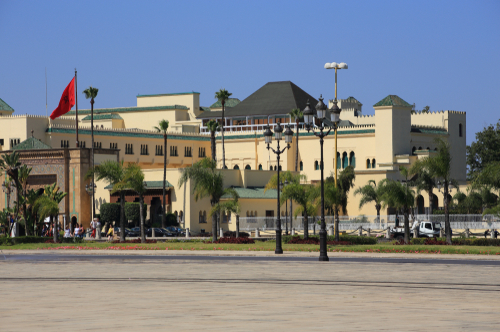
How can the study of the Moroccan state help us understand the state and the art of governing and systems of domination, in a global perspective? How can empirical work lead to theoretical generalizations? Béatrice Hibou and Mohamed Tozy have conducted three decades of fieldwork that inform and sustain their book entitled Tisser le temps politique au Maroc. Imaginaire de l'Etat à l'âge libéral (Weaving Political Time in Morocco. The Imaginary of the State in the Neoliberal Age) (Karthala, 2020). Interview with the authors.
Your recent book on Morocco appears as a general and universal reflection on the state and the art of governing. How is a comparative perspective important to this work?
Thank you for having identified the theoretical ambition of our empirical research. It is indeed fundamental for us. We have conducted almost 30 years of fieldwork, but for us the aim of this was really to confront theoretical questions on the state and the art of governing, and more precisely on how to approach changes in the state and in systems of domination. To respond more directly to your question, three factors appear—a posteriori—to be important in our comparative approach.
The first factor is our methodological direction: the question of reasoning through ideal types. Following Max Weber and using his expressions, thinking with ideal types means highlighting the “distinctive features” of social practices in their “most marked profile”, from the “concrete given” as it “presents itself in the historical reality”. The ideal typical method is an intellectual construction that helps us to reason and notably, for us, to make the description of governmental practices more complex, by freeing us from often implicit normative assessments. More precisely, we have attempted to depart from any perspective that sees, for example, the fact that there are no official regional state representatives as a “weakness”, the ceremonial renewal of allegiance and the mixture between private and public as “archaic”, and the fact that a non-institutionalized intermediary may intervene in public policy as “dysfunctional”. Stemming from a specific and recent conception of the state (from the modern age, according to the periodization of historians), these visions prevent a global reading of the practices and the conceptions that are present in the field.
In order to avoid these restrictive assumptions, we have created two ideal types that we have called “empire” and “nation-state” (or “imperial state” and “nation state”), intellectual elaborations capable of retracing two different ways of understanding power relations, ways of governing, and domination. We have done this by drawing from the historical trajectory of Morocco, but without wanting to identify any given historical moment as an archetype, i.e. without considering the Sharifian empire as the model for the empire ideal type or contemporary Morocco as the model for the nation-state ideal type. In fact, in pre-colonial Morocco, different modes of government coexisted, integrating direct and legal-rational interventions that are distinctive of the nation-state ideal type. Similarly, in contemporary Morocco, governments make use of sophisticated mises-en-scène, such as in ceremonies of allegiance, or in the persistence of dahir (a king’s decision close to a decree) as a way of legislating, which are distinctive of the empire ideal type.
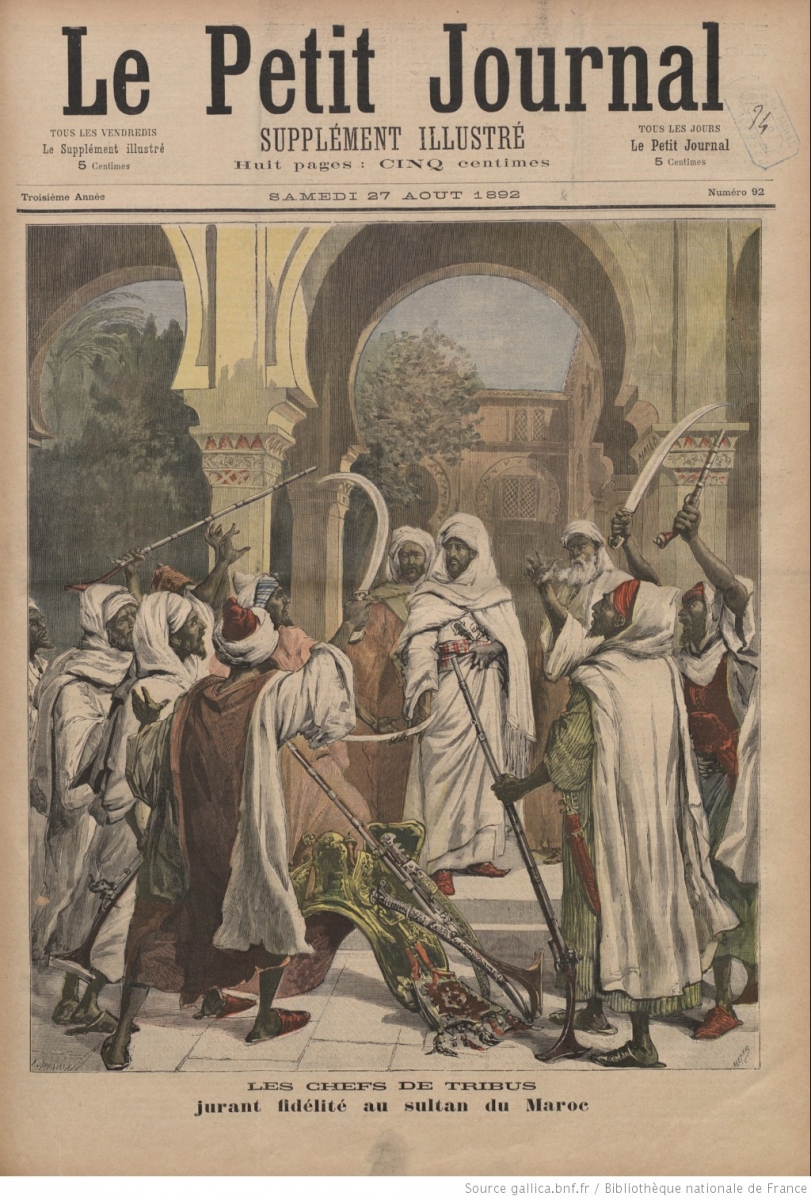
Le Petit Journal. Supplément illustré. Les chefs de Tribu. Source gallica.bnf.fr / Bibliothèque nationale de France
We have therefore constructed the empire ideal type as a combination of a whole series of features: the absence of an ambition to control the entire society and a propensity to favour compromise and adaptation; the refusal to systematically associate legitimacy with possession of a monopoly on power, including a monopoly on the use of violence, which itself seems more spectacular than systematic; a will to govern at a minimal cost by multiplying the modalities of intervention and intermediation; an accommodation of a pluralism of legal regimes, ethnic groups, nations, and religious groups, and a capacity to manage both territorial and temporal discontinuities; a massive investment in the production and control of information on territories both near and far away, and a tendency to bet on people rather than institutions and structures. To say it in a simple formula, this type of state seeks to govern while sometimes renouncing the administration of affairs. As for the nation-state, it is based on the principles of uniqueness and continuity, voluntarism and domestication, standardisation and abstract equality, investment in systematic and homogenizing information, privileging averages and the law of large numbers and highlighting transformative action.
Very concretely, this theoretical construction has allowed us to go beyond evolutionary analyses that see the imperial state as a form of endangered species, and the nation-state as the only modern form of state, which in a country like Morocco, would nevertheless be difficult to realise. It has also allowed us to identify the simultaneous diversity of power relations, conceptions of authority, sovereignty, responsibility, or representation, modes of action, and roles of the state, as well as how the state’s legitimacy might be understood. Clearly, our approach is not specific to the Sharifian kingdom. It has a dimension that is unmistakably general (and thus comparative), and this is also one of the ambitions of our book. Recourse to the ideal typical analysis of the state and to conceptualisation in terms of the entanglement of temporalities makes it possible to think of invisibilities. This can be seen in France, for example, with territorial discontinuity (in the existence of overseas territories) and legal pluralism (in Alsace-Loraine with canon law and in Mayotte with state Islam), which in the Jacobin ideology of the French nation-state can only be perceived in terms of abnormality and exceptionalism but which express other modes of power as soon as alternative state registers or references are introduced.
The second factor is our conceptual approach: the will to appropriate powerful ideas, not through a work of pure theoretical elaboration and speculation but through a “thick” empirical work, as Clifford Geertz would put it, to imbue these ideas with rich content. The dialogue and permanent entanglement between theoretical reflection and empirical research is distinctive of our approach—it is also very Weberian in character, like most of the concepts that structure our research.
This is certainly the case for our conceptualisation of the state. Against the commonly accepted readings of Weber and political science textbooks, we do not consider the state solely as an institution or a group of institutions. We do not limit it to an entity that would claim a monopoly on the legitimate use of violence. With Weber, we understand the state in a relational manner—as very diverse modes of action, including in the forms of non-action and laisser-faire—and as the idea of and belief in norms that allow the exercise of domination through permanent adjustments of a different nature. We were made aware of this conceptualisation thanks to our collaboration with Jean-Pierre Grossein, a specialist on Weber’s work. And we have been able to give substance to this conceptualisation of the state because our field, understood as a place to define our questions and concerns, had already made us attentive to the plurality of types of public action, to the multiplying places and forms of the exercise of the political that are situated most often outside of the places that are institutionally devoted to them, to the importance of representations, ideas, values, and norms in the exercise of domination, and to the importance of tensions, conflicts, and struggles for the construction of cultural hegemony.
The to and fro between empirical experience and theoretical elaboration in our work has not only occurred around or in articulation with concepts coming from the Western intellectual tradition, of which Weber would be the emblematic figure. The Islamic tradition has also played a large role, maybe more implicitly (although political thinker Ibn Khaldoun is present from start to finish in our exposition), but clearly evident in the way we have approached issues of representation and norms, such that they may appear through the question of the perception of the mandate of elected representatives and their relation to electors and of the independence of magistrates.
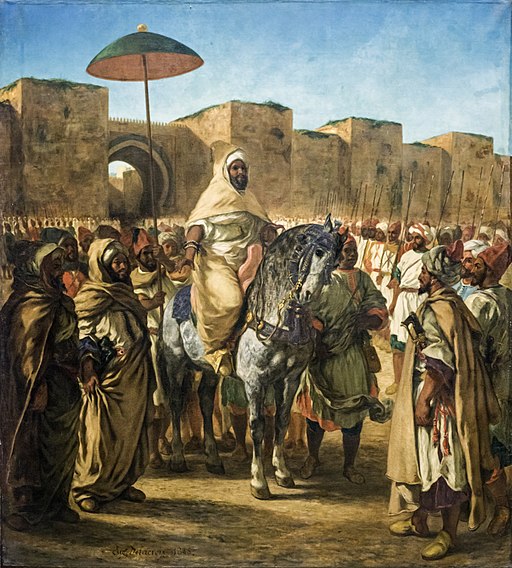
Moulay Abd-er-Rahman, Sultan du Maroc, sortant de son palais de Meknes, entouré de sa garde et de ses principaux officiers,
Eugène Delacroix, Public domain, via Wikimedia Commons
Making a detour through the classics of Islamic thought—and not only the accepted readings privileged by Orientalists and reappropriated by certain exegetes and ideologues of the state in Islam, including the reformists of the French protectorate and the currently ruling ideologues and theologians—helps us to avoid overinterpretations of the caliphate as a theocracy. The confrontation of Ghazali, Ibn Khaldoun, and Mawardi, cherished by specialists of public law looking for an authoritarian nation-state, has highlighted certain observations that go against the dominant discourse. To support the hypothesis of an absence of God in the city and of an executive magistracy through the caliphate (which literally means vicariate or lieutenancy) is, in this sense, more in keeping with a work on texts that carries the idea of a place of power that is empty and/or saturated by God (hakimiya ). A power theoretically unlikely to be appropriated other than in the context of a conditioned delegation.
This theoretical starting point, which gives meaning to a shared imaginary, enables us not only to think about the fragility of the legitimacy of power or of the current state of dissent, but also to reconsider issues of representation and incarnation, such as the ideas of responsibility and accountability. Acknowledging the fact that all power is, a priori, a usurpation and that it is acceptable only in conditions of necessity and solely in its dimension of authority ( autoritas) is crucial in deconstructing the relations between the rulers and the ruled. Only the confrontation between our field and these classics of Islamic thought has enabled us to understand this perception that power is outside of society and that it can only emerge from a balance of power, the only tangible yet ephemeral and temporary sign of a divine election. It has also enabled us to realise that the field of possibilities remains open thanks to opportunities offered by the ideas of hakimiya (a place of power saturated by God and therefore empty) and of delegation, which allow the ruled to designate the rulers.
The third factor is our problematic : we have chosen to examine the issue of change through the notion of the imaginary by refusing its limited and narrow understanding. The use of the imaginary is not a sophisticated way of thinking about permanency or continuity, or of showing an eternal Morocco, a nation-state struggling with an imperial phantom or a neo-liberal Morocco reinventing an undeveloped form of imperial state on the ruins of a nation-state in crisis. Quite the contrary. As soon as the imaginary is understood as much in its conceptual, or even dreamlike, dimensions as in its everyday materialisation, it helps us to think about change. The imaginary is this global concept that enables us to reproduce the framework of meaning—necessarily specific to each moment—in its social and historical depth.
Indeed, resorting to the notion of the imaginary makes it possible to see in the same glance the different faces of social life—from language and bodily postures to passions, from strategies of appropriation and interpretation to manners, everyday know-how, and social skills, from appropriations and reinventions to dispositifs and technologies of power, from concepts and categories to the ways of apprehending time, space, and social relations.
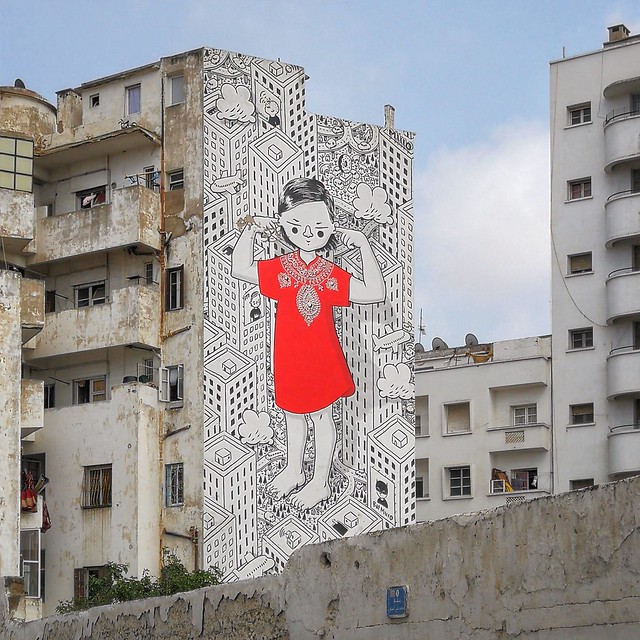
Street art in Morocco, Copyright: https://visualhunt.co/a6/742a1a, Paolo Margari, CC BY-NC-ND
One of the originalities of your work is that you highlight the elective affinity between neo-liberalism and the imperial register of the art of governing. Can you explain what this affinity consists of and what it suggests in terms of the conception of power?
At the origin of this research was our assessment that the governmental configurations that are specific to neo-liberalism were not perceived, in Morocco, as ruptures that would call into question governmental traditions, conceptions of public action or the general interest, or the imaginary of the state. Conversely, and in contrast to other countries—such as Tunisia on which we have worked in the past—the engineering as well as the more diffuse dispositifs, or even neo-liberal practices, are experienced as something familiar, some sort of dejà vu, something common, banal. This is the case for delegation, for the multiplying places where power is exercised, for the multiplying mediations and means through which domination is exercised, and for the government through councils or a low-cost conception of power. This explains the processes of naturalisation that we have been able to see through interviews with senior state officials and the observation of everyday practices. All these techniques, these processes—which appear as symbols of a new era elsewhere—are perfectly well integrated in the Moroccan state imaginary, to the extent that they are not identified as relating to a specific political conception but to new reinventions of tradition. They appear as obvious and are not called into question.
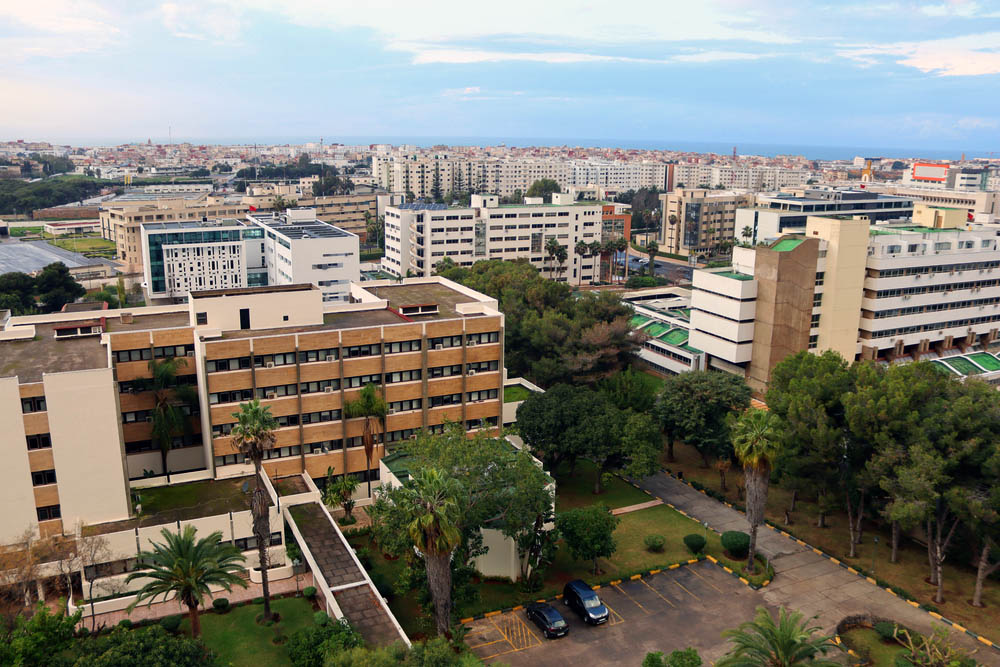
Administrative district in Rabat, Morocco. Source: Photopertti, Shutterstock
This is what we have tried to analyse in terms of affinity. This affinity cannot be considered as the expression of permanence and of the role played by the concept of makhzen or as the reactivation of ancient practices falling under the concepts of traditionalism and traditionalisation. To take an example, the “government at a distance” that is promoted by many neo-liberal dispositifs cannot be assimilated to the “indirect government” of the Sharifian empire. Affinity must be understood as the existence of “matching” between specific forms of government stemming from the intellectual and political hegemony that is called neo-liberalism and common ways of understanding power in a historically situated context. In Morocco, these “relations of compatibility” have generated effects of acceptance, support, reinforcement, or acceleration of neoliberalism rather than effects of rejection or suspicion toward this ideology. Through them, new modes of action became evident, familiar, and natural and, in a certain way, seen as a break with previous practices of interventionism and developmentalism in the 1960s and 1970s. Affinities between the neo-liberal and imperial governments are obviously not homogeneous: there are gradations in their homogeneity or their compatibility, differences of intensity in their internal kinship, and the mediation through which they express themselves are more or less direct, more or less known, explicit or diffuse. It is also necessary to distinguish affinity and simple coincidence, or false coincidence because affinities are not systematic.
The interest of reasoning through ideal types is clear here. The ideal types of the empire and of the nation-state have enabled us to understand the current neo-liberal moment, not as an advanced stage of the nation-state or a reinvention of empire, but as a political moment that articulates features (dispositif and engineering, practices, values, representations) stemming from the register of empire as much as of the nation-state. Thus we show that the empire ideal type “naturalises” transformations of modes of government and of society by referring to self-evident facts and by using reasonings that go without saying, establishing truths that spread precisely because they rest on the political and social imaginary. It is in this sense that the naturalisation forestalls conflicts of meaning: it enables all actors to integrate changes or new situations from their own capacity to seize the possibilities offered by the many meanings of expressions, behaviours, or engineering, without departing or standing out from the imagined community.
Here again, our exposition has comparative as well as general ambitions. Our analysis of elective affinities between neo-liberalism and the imperial register can easily be generalised to other situations, including ancient empires such as China (and its famous “one state, several regimes”) and Turkey, amongst others, by highlighting the weight of indirect modes of government and more generally other characteristics of power such as the bet on people more than on territories, the centrality of information, or mobility.
Interview by Corinne Deloy, CERI.
English version by Miriam Perier (CERI) and Caitlin Gordon Walker










